Building Bridges and Bonds to Make Cross-Cultural Impact
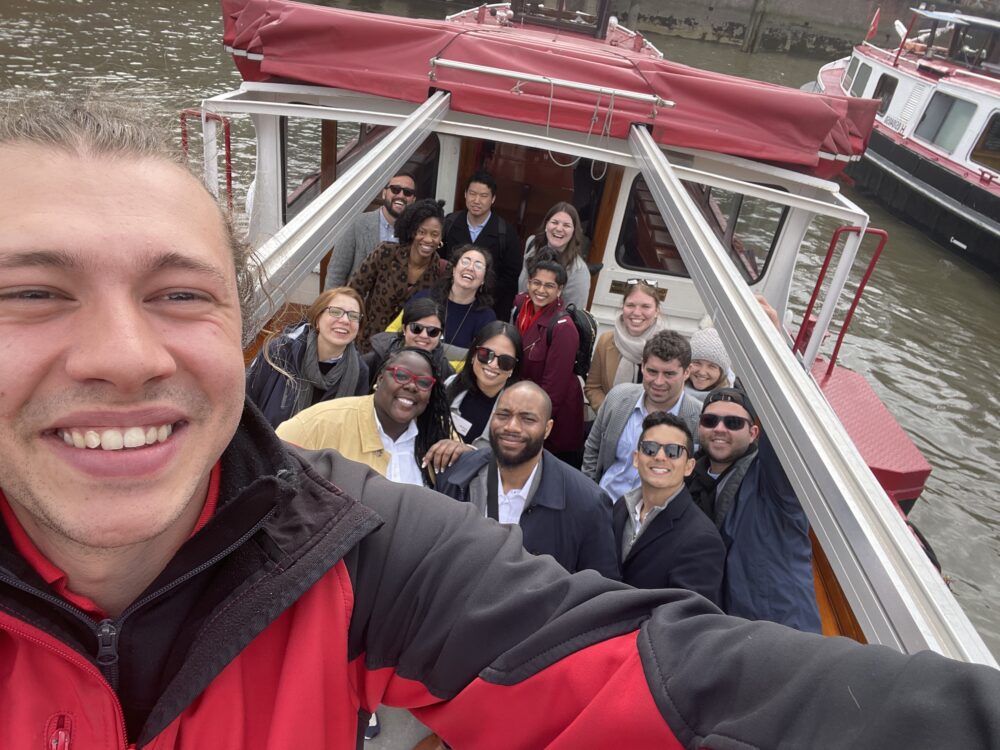
Members of the New Bridge Cohort #6 are pictured after a harbor cruise in Hamburg, Germany.
“Intercultural dialogue is the best guarantee of a more peaceful, just and sustainable world.” — Robert Alan, American writer, artist and social activist
With this quote in mind and an excessive amount of luggage, the sixth New Bridge cohort left Washington, D.C., eager to begin an unimaginable adventure: one that sparked meaningful conversations, broadened perspectives, and gifted us all with a sense of empowerment – and a deepened awareness on the impact and importance of intercultural communications between the U.S. and Europe.
The programming intentionally and strategically provided us a crash course in transatlantic relations in 10 days, covering diversity and anti-discrimination in Germany, education, Germany’s political system, migration, climate change, the impact of Russia’s invasion of Ukraine, and even conversations with the U.S. Ambassador to NATO.
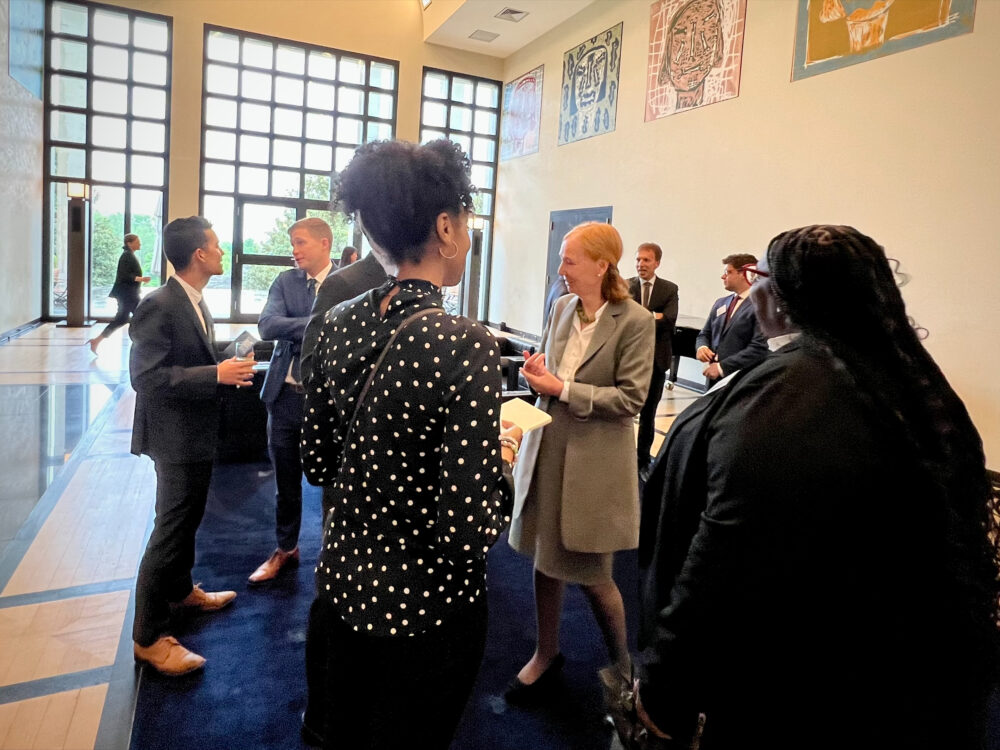
The New Bridge Fellows in conversation with Dr. Emily Haber, German Ambassador to the USA
The cohort met in person for the first time at a welcome dinner in Washington, D.C., where we grew excited for what lay ahead. We kicked off programming with an introduction to transatlantic relations at Georgetown University that helped prepare us for an engaging conversation and lunch roundtable with Dr. Emily Haber, German Ambassador to the U.S., where we discussed transatlantic relations and global challenges. We ended the D.C. arm of the trip with tours of the ARD news studio and U.S. Holocaust Memorial Museum.
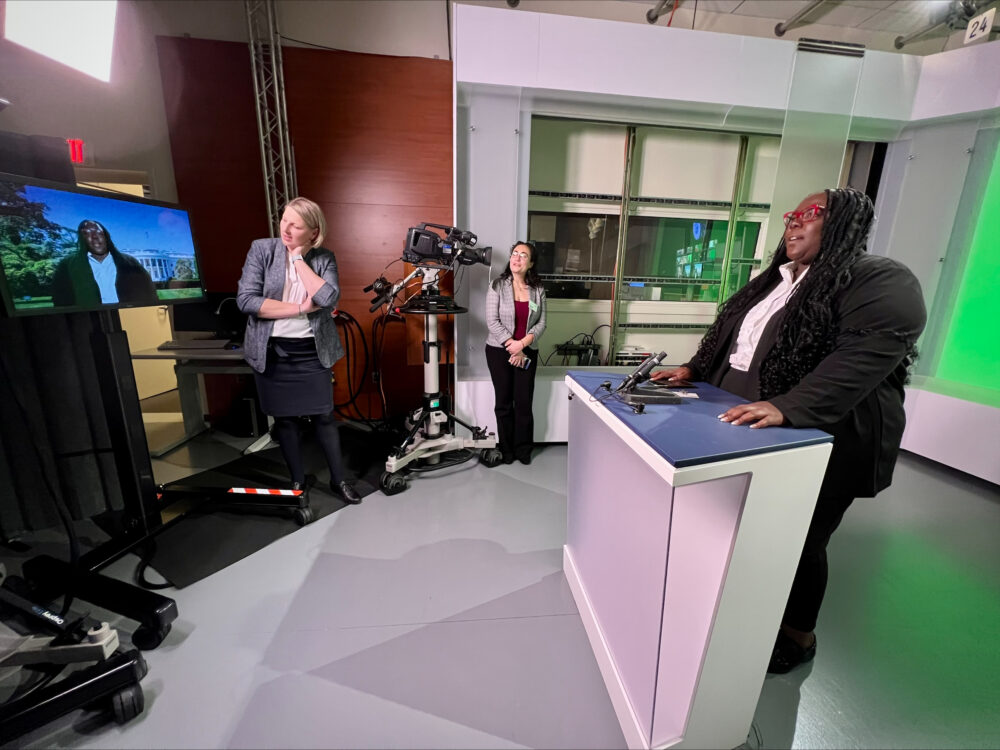
New Bridge fellow LaGloria Wheatfall (right) delivers a “standup” in front of a green screen at ARD’s Washington bureau, while ARD news anchor Gudrun Engel (left) looks on.
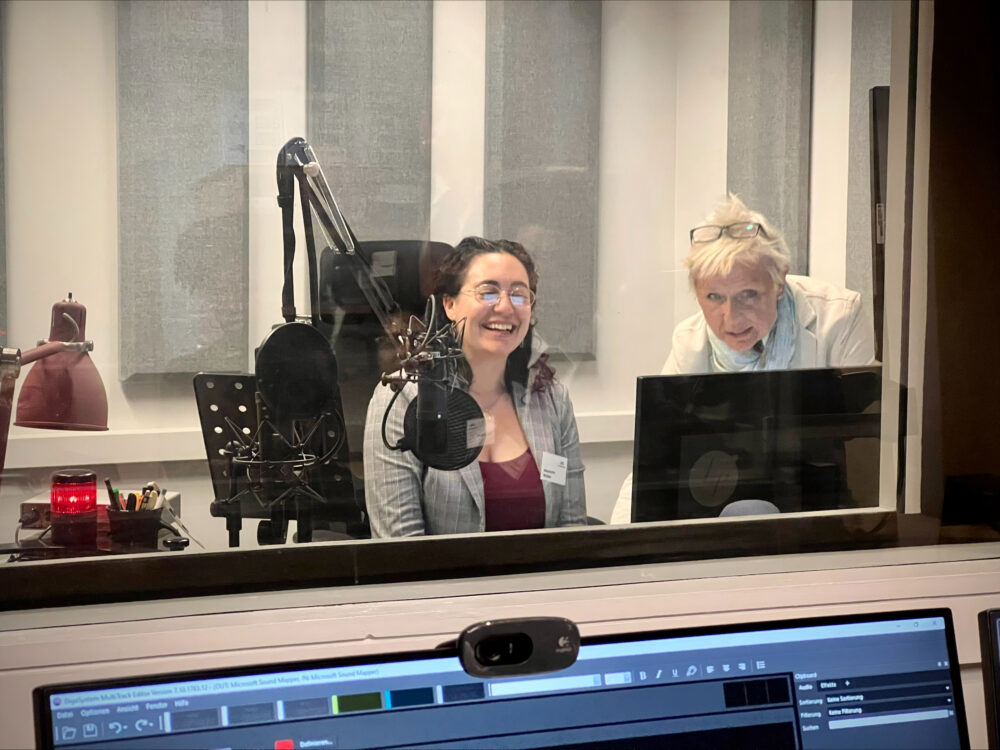
New Bridge fellow Alexandra McGee (left) records a voiceover with ARD’s Katrin Brand.
Several hours later, we arrived in Berlin, where we were quickly immersed in the culture via a guided walking tour to learn about the rich history of the country. The tour provided invaluable context to the various conversations and lectures we had in Germany.
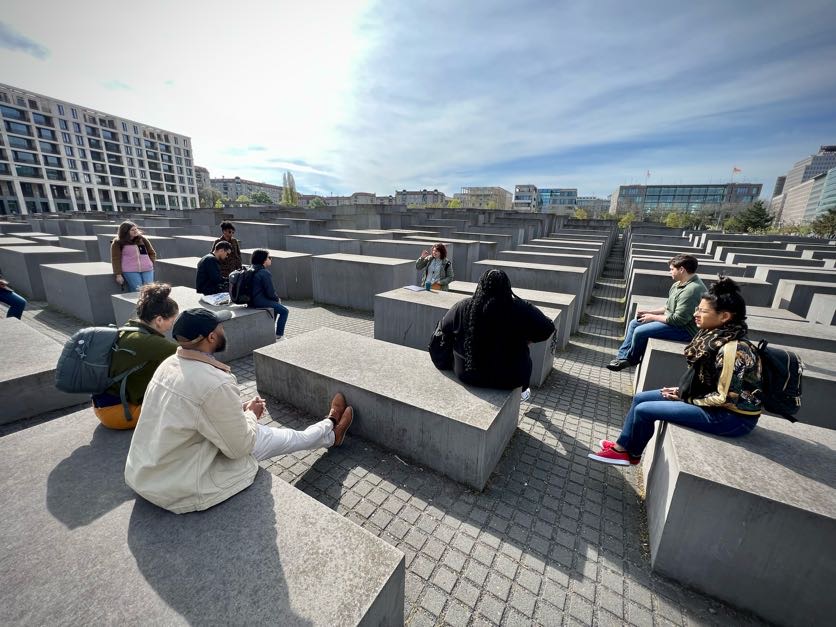
New Bridgers toured several sites in Berlin, including the Memorial to the Murdered Jews of Europe and the Berlin Wall.
We participated in briefings around the dual education system and the political system. We heard from speakers including Angelo Camufingo, who spoke on diversity and anti-discrimination in Europe. We discussed climate change and the environment with two fearless young advocates from Fridays for Future over dinner. We visited the U.S. Embassy and the German Bundestag, and we even took a train trip to Hamburg to see the German apprentice system in action on a harbor cruise.
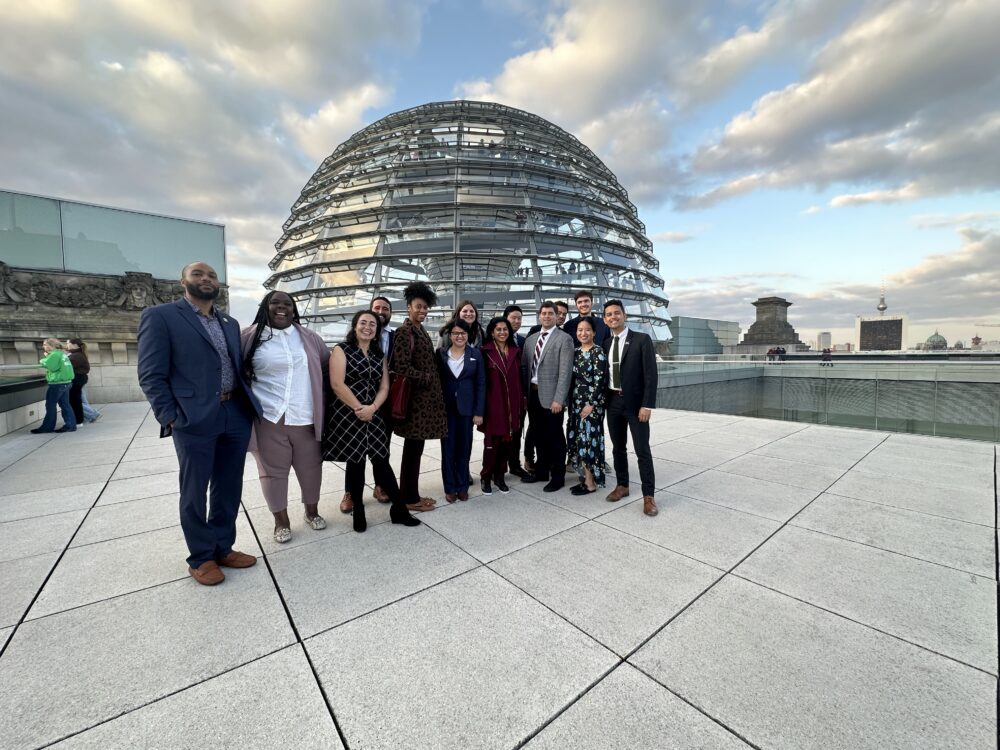
New Bridgers pose on top of the Bundestag
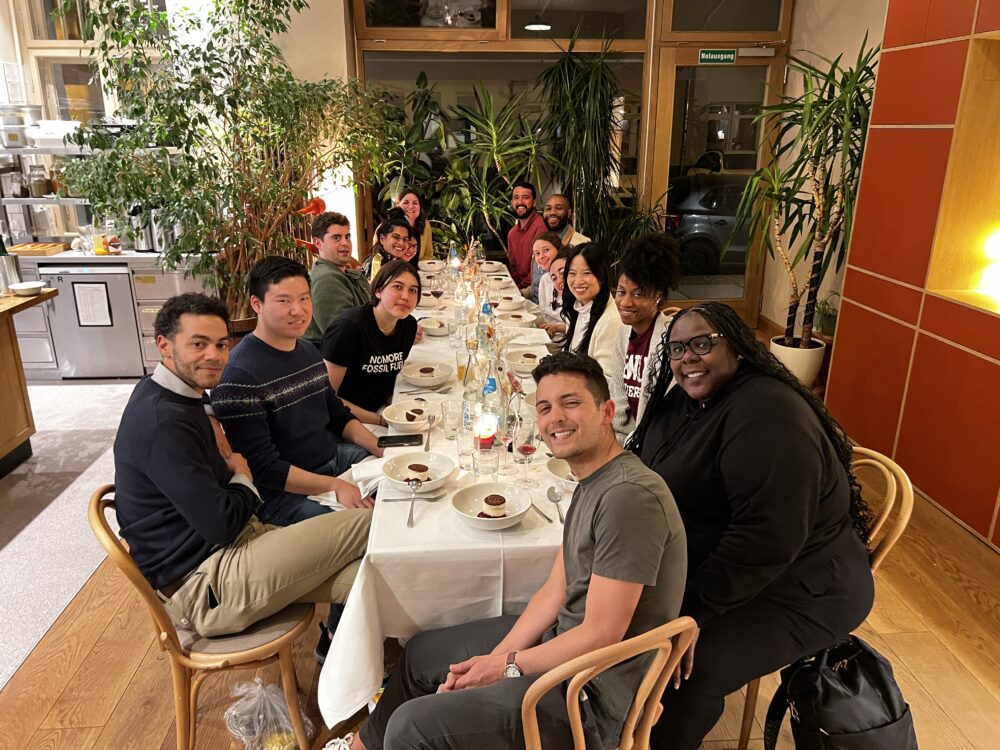
New Bridgers dined with Fridays for Future activists Helena Marschall and Samira Ghandour at FREA Lab.

On a harbor cruise in Hamburg on May 3, 2023, New Bridgers took in sights that included the famous Elbphilharmonie building and some of the largest cargo ships in the world.
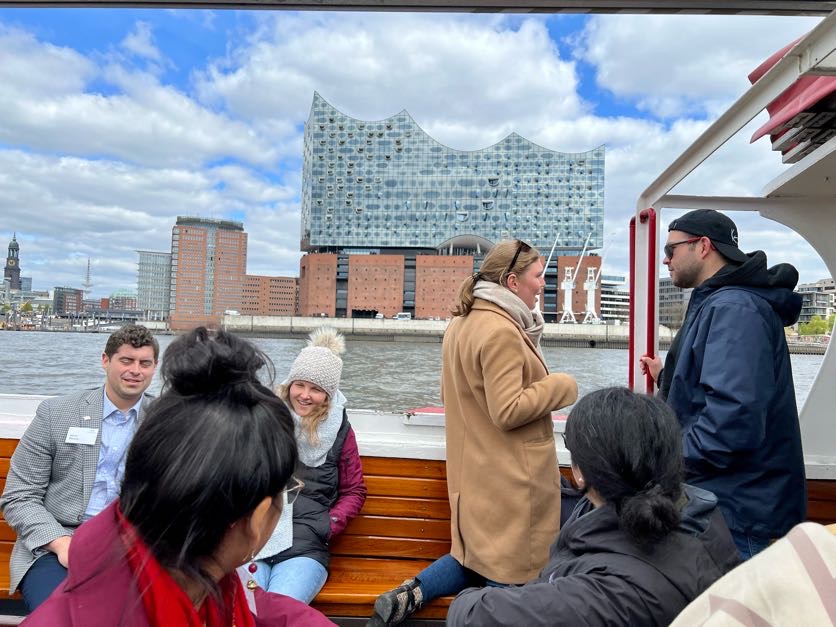
Our learning journey didn’t stop there! We hopped on another plane and arrived in Brussels, where the first stop was a tour of the European Parliament. There, we engaged in an encouraging conversation with Dr. Sergey Lagodinsky, member of the European Parliament, Alliance 90/The Greens.
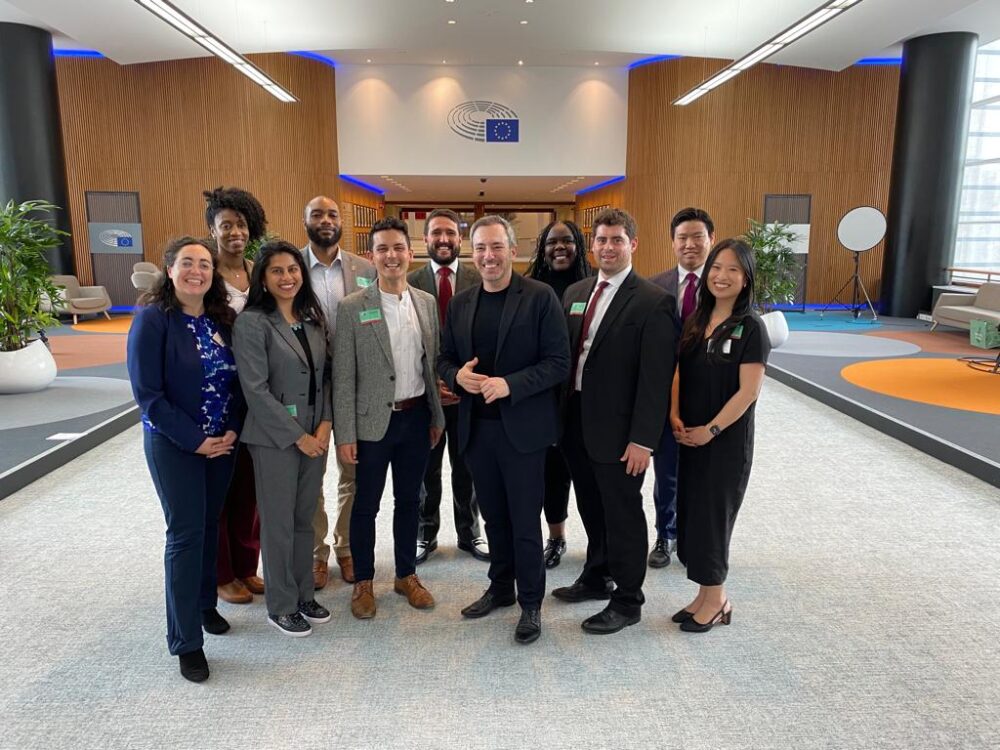
New Bridgers met Dr. Sergey Lagodinsky at the European Parliament in Brussels.
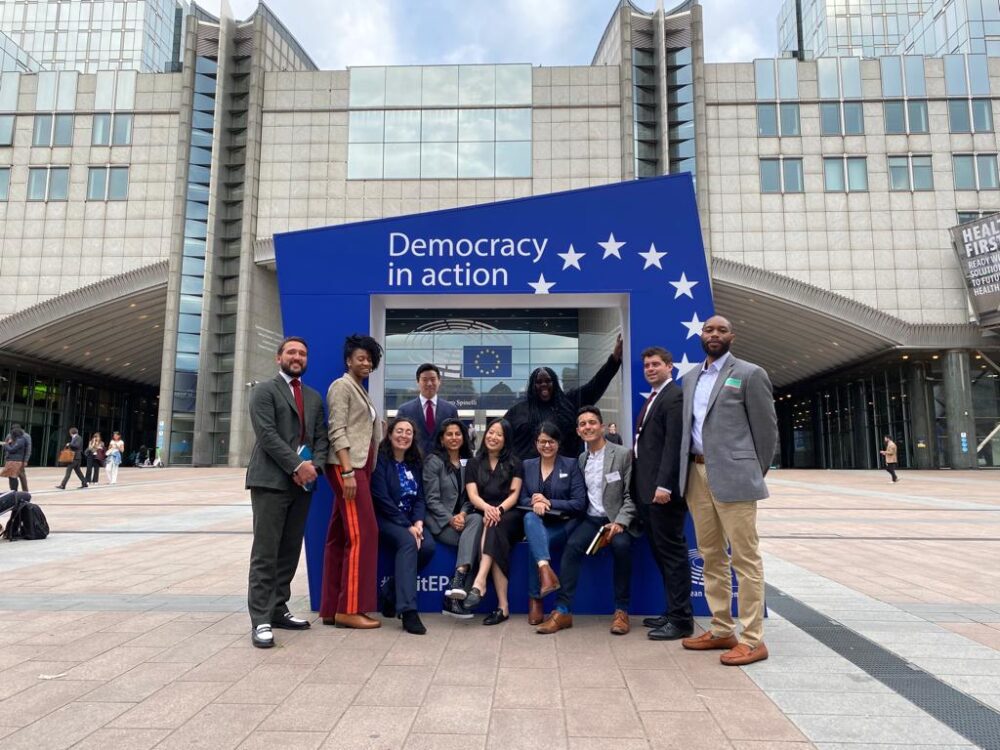
The Brussels trip ended with an insightful guided tour through NATO headquarters and an invigorating discussion on transatlantic security and defense hosted by Ambassador Julianne Smith, U.S. Permanent Representative to NATO.
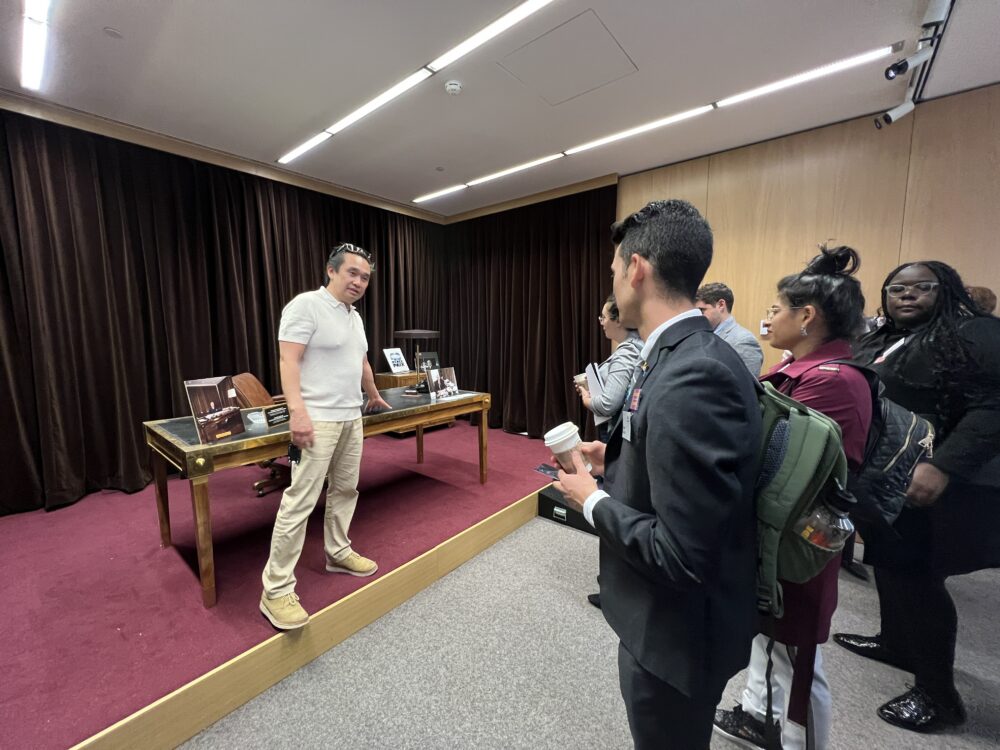
NATO archivist Nick Nguyen led an illuminating tour through NATO headquarters in Brussels.
The diversity of professional backgrounds, cultures, and racial identities made our cohort unique and enabled dynamic conversations that guided our overall experience. Below are some reflections from the cohort’s journalist team:
What have you learned about transatlantic relations?
-
- LaGloria Wheatfall, Washington, DC – Entering a conversation to listen instead of responding is key to all effective communication; but approaching intercultural conversations listening and with an open mind and the ability to hear other cultural perspectives will broaden your understanding and strengthen your tolerance to shape solutions that can impact the world.
- Cameo King, Detroit, MI – Transatlantic relations is one of the most vital components in creating a sustainable future in a quickly growing global economy. While many may view the relationship between countries, nations, and cultures as high level and intangible, it very much touches the daily interactions of everyday citizens through climate change, domestic terrorism, economic stability, and renewable energy needs to name a few. Understanding the interconnectedness of European countries, first to one another and then to the US is critical in ensuring there is an equitable, thriving, and sustainable future for global social systems, economy, and environment.
- Julian Pecora, Huntington, WV – I learned a year’s worth of transatlantic relations in ten days. After the fellowship, I am able to comprehend the importance of German-American relations and its strategic importance for national defense and economic relations.
What have you learned about Germany, Europe, and perhaps the U.S. during the program? What are some of our similarities or differences? What surprised you?
-
- LaGloria – I was mind-blown that Germany does not have a Census collecting racial data. I think the cohort consensus was surprised at how Americans are super data driven and are comfortable with being tracked demographically in every area of our lives. It’s our norm. And we get uncomfortable and almost have a disbelief in any system that doesn’t do the same.
- Cameo – One of the most intriguing components and differences between Germany and the US is the heightened awareness Germans have of US politics and its impact on the world. This characteristic is also a consistent thread when it comes to neighboring countries, especially as Germany is basically a landlocked nation, unlike the U.S. However, one of the most surprising aspects I learned about Germany is the deep cultural influence and future impact the Allied Nations would have on the future economy, structure, and ultimately the way of life of Germans.
- Julian – I learned that Germany is a very efficient country and the most influential leader in Europe. Germany acknowledges its past, but is forward-thinking and a leader in the European community. I was surprised at how informed Germans were on United States elections and policies.
What do you take back with you (for yourself, your work, or your community)?
-
- LaGloria – Working in the global DEI and social impact space, I will ensure that I speak up on intercultural systems that we may not consider when implementing DEI strategy and efforts, so that inclusivity isn’t limited to just the US but widened to shift the world view.
- Cameo – The question that I continued to ruminate on in every conversation and experience, was how does this impact the community I am connected to? As the founder of a movement that centers the Black experience through sisterhood and self-actualization, oftentimes the voices of minoritized groups are left out of conversations that shape communities, the world, and our everyday lives. My goal is to be intentional about creating pathways for Black women and girls to be a part of conversations around transatlantic relations that value, affirm, and use their intellect, experience, and influence as the standard and not the exception.
- Julian – I am returning the network and the knowledge I learned about transatlantic relations to Appalachia. The relationships I have made will pay dividends for my community in the future.
What is your hope for the NEW BRIDGE PROGRAM in the future? Any final thoughts you want to leave us with?
-
- LaGloria – I hope that we can use this network of people who had the opportunity to participate in this once in a lifetime experience, to convene and continue conversations that will effectively change the transatlantic relations game for the good of humanity.
- Cameo – New Bridge is an intense intro, dare I say grad level, course into transatlantic relations. It is intended to provide the breadth and depth of German history in a short ten day time span from ensuring there are multiple cultural perspectives from varied sectors to including the lives of everyday German citizens. Because of the intensity and the substance of New Bridge I would hope there is an opportunity in the coming months or year to debrief collectively and share how the program has impacted our world view, career path, and everyday choices. New Bridge by far creates a strong foundation for creation of bridges in relationships, businesses, and economies across the Atlantic.
- Julian – I hope the New Bridge Program continues growing and developing strong relationships between the young professional community in the USA and Germany.
Das Projekt wurde durch das Transatlantik-Programm der Bundesrepublik Deutschland aus Mitteln des European Recovery Program (ERP) des Bundesministeriums für Wirtschaft und Klimaschutz (BMWK) gefördert.
